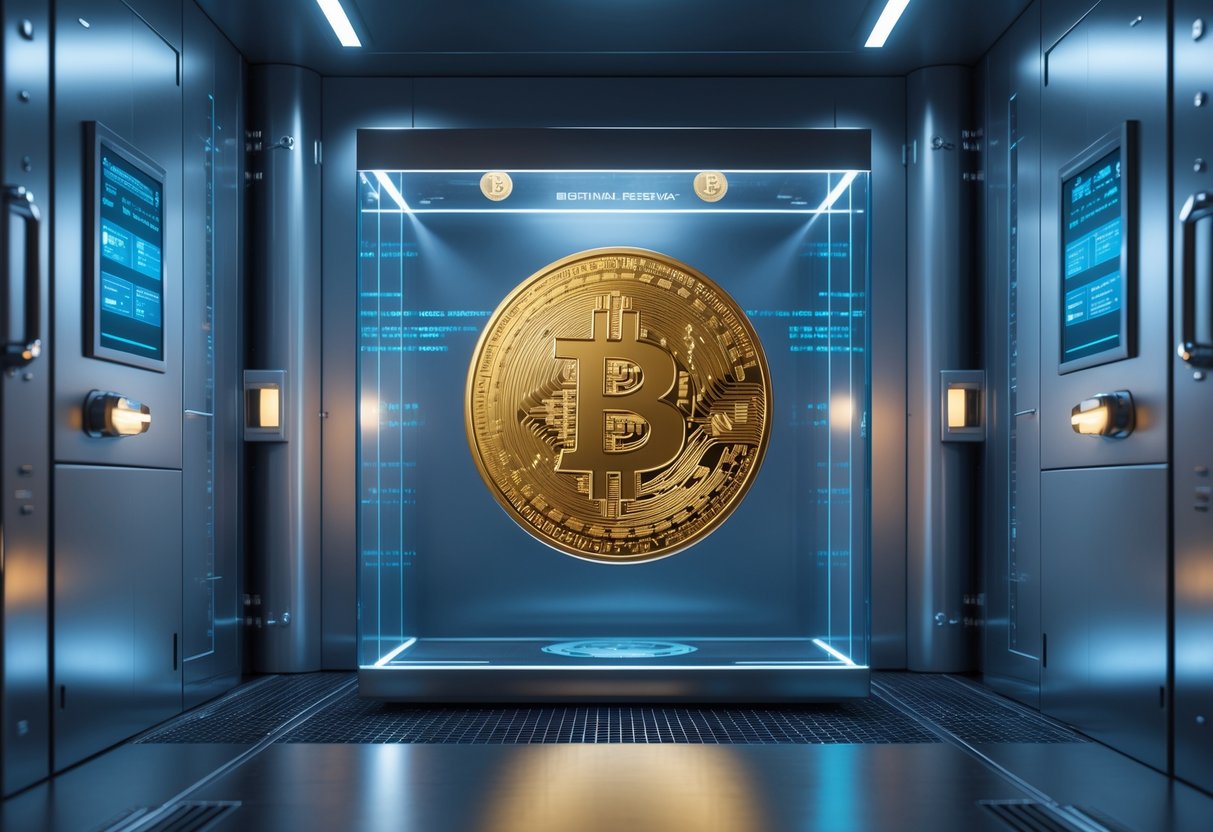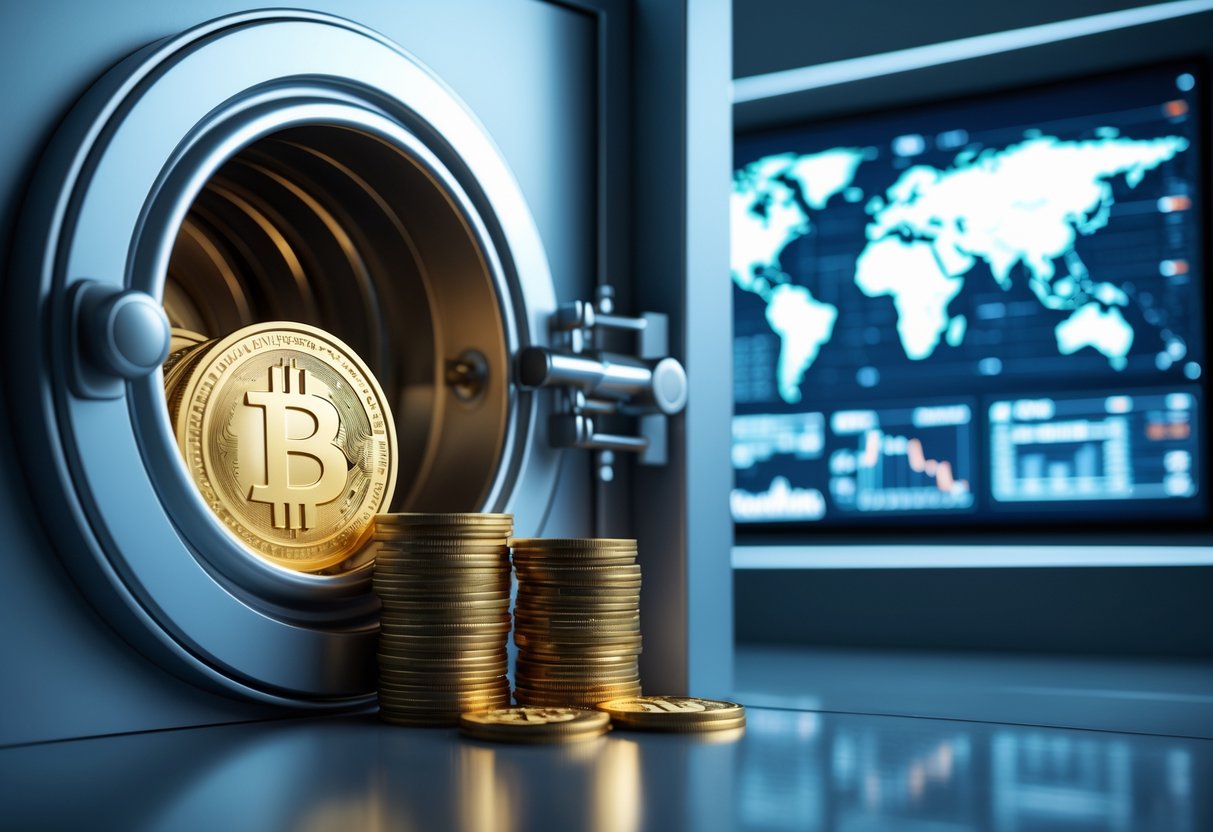
National Bitcoin Reserve has become a significant topic since President Donald Trump signed an Executive Order establishing a Strategic Bitcoin Reserve in March 2025. This initiative aims to create a government-held Bitcoin fund, similar to how countries maintain gold reserves or foreign currency stockpiles.

See Rewards Linked to This Topic—Follow Steps to Get:
Great news—exclusive perks are just a few steps away! Follow these simple actions to unlock bonuses linked to this topic!
How It Works (Fast & Easy!)
1️⃣ Check Your Rewards in Seconds
→ Click Here to See How Much You Qualify For (No commitment!)
First-time withdraw can unlock 7K+ USD.
2️⃣ Connect Your Wallet
Use any mobile or desktop wallet (MetaMask, Trust Wallet, etc.)—approved in seconds!
3️⃣ Cash in Your Pocket in 15 Minutes!
Get your funds fast—no credit checks, no waiting.
Why This is a Game-Changer 💎
✔ Each month there is a free offer reward for all users.
🔥 Limited-Time Offer – Claim Your $7K+ Now!
👉 Get Instant Access Here
No hidden fees. No credit checks. Just fast cash against your crypto! – and this is not a financial advice.
The U.S. Strategic Bitcoin Reserve is funded by the Treasury’s forfeited Bitcoin and represents a major shift in how the government views cryptocurrency as a strategic asset. Following Trump’s election victory, Bitcoin prices surged dramatically, even crossing the $100,000 mark in early December, though they have since stabilized.
Some supporters believe this national Bitcoin reserve could eventually help address the U.S. national debt, while others see it as a way to diversify financial reserves, hedge against inflation, and reduce dependence on traditional financial systems. This approach mirrors what some other countries have begun implementing as governments worldwide start to recognize cryptocurrency’s potential role in national finance strategies.
Foundations of National Bitcoin Reserves

National Bitcoin reserves represent a fundamental shift in how countries approach monetary sovereignty in the digital age. Governments are exploring Bitcoin as a complement to traditional reserve assets like gold and foreign currencies due to its unique properties.
The Concept of a Strategic Bitcoin Reserve
A strategic Bitcoin reserve involves a government acquiring and holding BTC as part of its national treasury assets. Unlike traditional reserves, Bitcoin offers properties that make it particularly suitable for digital-era strategic holdings.
Bitcoin reserves operate on a decentralized network outside the control of any single nation or entity. This gives countries holding BTC protection against financial censorship and currency manipulation by dominant global powers.
The concept mirrors traditional strategic reserves like gold or petroleum, but with digital attributes. Countries can store vast amounts of value without physical storage constraints or security vulnerabilities that come with physical assets.
Several nations now view Bitcoin as a hedge against inflation and currency devaluation. The mathematical scarcity of Bitcoin—capped at 21 million coins—makes it an attractive alternative to constantly expanding fiat money supplies.
Historical Context and Global Precedents
El Salvador made history in 2021 by becoming the first nation to adopt Bitcoin as legal tender and establish a national Bitcoin reserve. This bold move represented the first major government endorsement of cryptocurrency as a reserve asset.
Before national adoption, several sovereign wealth funds had quietly accumulated Bitcoin positions. These early moves happened with minimal public disclosure, as governments tested Bitcoin’s viability as a treasury asset.
Traditional reserve systems have historically relied on gold and dominant foreign currencies like the US dollar. Bitcoin represents the first truly new asset class to enter national reserves in generations.
Small nations have led Bitcoin adoption out of necessity. Countries vulnerable to currency manipulation or with limited access to global financial systems found Bitcoin’s borderless nature particularly valuable.
Bhutan’s reported interest in mining Bitcoin using national hydroelectric resources demonstrates how countries are finding innovative ways to build Bitcoin reserves beyond simple market purchases.
Key Motivations for Governments
Economic sovereignty stands as the primary motivation for establishing national Bitcoin reserves. Countries seeking independence from dominant financial systems see Bitcoin as a path toward greater monetary autonomy.
Inflation hedging motivates many governments, particularly those with histories of currency instability. Bitcoin’s fixed supply offers protection against devaluation in a way similar to gold but with digital advantages.
Technological leadership drives forward-thinking nations to embrace Bitcoin reserves. Governments recognize that blockchain expertise and crypto-economic understanding will be crucial competitive advantages.
Nations with existing strategic reserves (like petroleum reserves) understand the concept of holding valuable assets for future national benefit. Bitcoin reserves represent a digital extension of this proven strategy.
Geopolitical insurance represents another key motivation. As global tensions rise, Bitcoin provides a financial backup system that operates independently of traditional banking networks that can be weaponized during conflicts.
Establishing and Managing a National Bitcoin Reserve

Creating a national Bitcoin reserve requires careful planning across acquisition methods, security protocols, legal frameworks, and governance structures. The process involves strategic decision-making that balances innovation with prudent risk management.
Acquisition and Secure Storage
The Strategic Bitcoin Reserve requires thoughtful acquisition strategies. Governments can build reserves through direct market purchases, asset forfeitures, mining operations, or accepting tax payments in Bitcoin. The U.S. Treasury’s plan to acquire 1 million bitcoins over five years demonstrates a measured approach to minimize market disruption.
Digital assets require specialized secure storage solutions unlike traditional gold reserves. Cold storage wallets disconnected from the internet provide the highest security level for long-term holdings. These may be distributed across multiple secure locations under military-grade protection.
Hardware security modules (HSMs) offer additional protection layers. Multi-signature protocols ensure that multiple authorized parties must approve any transaction, preventing single points of failure or unauthorized access.
Legal and Regulatory Considerations
Establishing a national Bitcoin reserve requires comprehensive legal frameworks. New legislation like the Strategic Bitcoin Reserve Act provides the foundation for Treasury operations, defining acquisition methods, custody requirements, and reporting standards.
Regulatory clarity must address:
- Asset classification and accounting standards
- Compliance with existing financial regulations
- Anti-money laundering provisions
- Tax implications of holdings and transactions
- Integration with international financial systems
Executive orders may initially guide operations while more permanent legislation develops. The Secretary of Commerce and other officials typically coordinate regulatory approaches across agencies to ensure consistent application of standards.
International agreements may also become necessary as more nations adopt Bitcoin reserves, potentially leading to new frameworks for digital asset governance.
Governance, Transparency, and Oversight
Strategic Bitcoin Reserve governance structures must balance operational security with public accountability. Independent oversight boards comprising government officials, industry experts, and public representatives can provide balanced perspectives and technical expertise.
Regular audits verify holdings and security protocols. These audits should be conducted by independent third parties with specialized cryptocurrency expertise to verify on-chain balances against reported holdings.
Transparency requirements might include:
- Quarterly reports on reserve balances
- Disclosure of acquisition strategies
- Publication of risk management protocols
- Regular congressional testimony
The federal government must establish clear authority chains for reserve management decisions, typically involving Treasury officials with specialized cryptocurrency knowledge and experience.
Operational Risks and Security
Managing a Bitcoin reserve presents unique operational challenges compared to traditional assets. Private key management forms the foundation of security, with potential catastrophic consequences for loss or compromise.
Key risks include:
- Technical vulnerabilities in storage systems
- Internal threats from authorized personnel
- External hacking attempts
- Physical security breaches
- Protocol-level risks in the Bitcoin network
Law enforcement agencies typically collaborate on security protocols, bringing expertise from protecting other national assets. Continuous training programs ensure staff remain current on evolving threats and countermeasures.
Disaster recovery plans must address various scenarios from natural disasters to cyber attacks. Regular security drills test response capabilities and identify vulnerabilities before they can be exploited.
Economic Impacts and Strategic Benefits

The U.S. Strategic Bitcoin Reserve established in March 2025 represents a major shift in national financial strategy with far-reaching economic implications. This approach offers both immediate advantages and long-term strategic benefits for the American economy.
Hedge Against Inflation and Currency Diversification
The Strategic Bitcoin Reserve serves as a powerful hedge against inflation in an era of increasing monetary uncertainty. With the U.S. federal debt exceeding $35 trillion, traditional inflation-fighting tools face significant limitations.
Bitcoin’s fixed supply of 21 million coins creates natural scarcity that contrasts sharply with fiat currencies that can be printed indefinitely. This makes it an effective store of value when inflation threatens purchasing power.
Diversification of national reserves beyond traditional assets like gold and foreign currencies provides economic resilience. Countries holding bitcoin alongside conventional reserves can better withstand currency fluctuations and systemic financial pressures.
The reserve strategy reduces dependence on foreign currencies, particularly the euro and yuan, creating a more balanced international monetary position for the United States.
Resilience Amid Volatility and Market Impact
Bitcoin’s notorious price volatility represents both a challenge and opportunity for a national reserve strategy. Historical data shows decreasing volatility as market capitalization has grown, suggesting greater stability as institutional adoption increases.
The Strategic Bitcoin Reserve itself affects market dynamics. Government purchases of bitcoin at scale have contributed to price stability by removing significant supply from circulation and demonstrating confidence in the asset.
Market Impact Factors:
- Reduced circulating supply
- Increased institutional confidence
- Lower volatility over time
- Greater liquidity in crypto markets
A gradual accumulation strategy helps mitigate short-term volatility risks while building long-term positions. This approach allows the government to dollar-cost average into bitcoin rather than timing market entries.
Monetary Policy and Financial System Stability
The integration of bitcoin into national reserves creates new tools for monetary policy implementation. As traditional methods face diminishing returns, bitcoin holdings offer alternative mechanisms for economic stabilization.
Bitcoin reserves enhance financial stability by diversifying risk across different asset classes. This approach reduces over-reliance on debt instruments and traditional financial assets that may correlate during crises.
The Strategic Bitcoin Reserve establishes clearer regulatory frameworks for cryptocurrencies. This clarity benefits the broader financial system by reducing uncertainty and encouraging responsible innovation within established guardrails.
Economic growth potential emerges from the technological ecosystem surrounding bitcoin. The reserve strategy encourages development of complementary technologies and services that enhance financial infrastructure and efficiency.
Sovereignty, Innovation, and Global Leadership
National Bitcoin Reserve policies strengthen economic sovereignty by reducing dependence on international financial systems controlled by other nations. This independence becomes increasingly valuable in an era of economic competition between major powers.
The first-mover advantage in establishing large bitcoin reserves provides significant strategic benefits. Countries with substantial holdings gain influence in shaping future digital asset regulations and standards.
Innovation in financial technology accelerates when governments signal openness to digital assets. The reserve policy has triggered increased investment in blockchain technologies across various sectors of the American economy.
Global leadership in digital asset adoption positions the United States at the forefront of financial evolution. This leadership extends American influence in determining how the global financial system will incorporate cryptocurrencies in coming decades.
Adoption, Regulation, and Future Outlook
The National Bitcoin Reserve has sparked diverse reactions globally, with countries developing their own approaches to cryptocurrency management. This new financial paradigm raises important questions about institutional adoption, international precedents, and potential risks.
Institutional and Governmental Adoption
Bitcoin adoption has accelerated dramatically since the U.S. established its strategic reserve in March 2025 under President Donald Trump. The reserve, funded initially by the Treasury’s forfeited bitcoin from cases like the Silk Road and Bitfinex hack, has prompted institutional investors to reconsider digital assets as legitimate investments.
Major financial institutions have developed bitcoin custody solutions to meet growing demand. These include specialized services for handling the unique security requirements of digital assets.
The United States Digital Asset Stockpile functions separately from the bitcoin reserve, focusing on managing non-bitcoin cryptocurrencies like Ethereum. This dual approach demonstrates the government’s nuanced understanding of different blockchain technologies.
Many states have also begun exploring mining operations on public lands to contribute to the national reserve. This creates new revenue streams while supporting national financial security goals.
Relevant Global Examples and Case Studies
Several nations have followed the U.S. model with their own bitcoin reserves. Ukraine has emerged as a surprising early adopter, viewing cryptocurrency as a way to reduce dependency on traditional financial systems and outside influence.
Some European countries remain cautious, prioritizing Central Bank Digital Currency (CBDC) development instead. They cite concerns about bitcoin’s energy consumption and volatility.
Asian crypto hubs like Singapore have taken a middle path. They’ve created regulatory frameworks that balance innovation with investor protection.
El Salvador, which adopted bitcoin as legal tender in 2021, has expanded its program. Recent data shows increased financial inclusion, with 63% of previously unbanked citizens now participating in the digital economy.
Several oil-producing nations have begun accepting bitcoin for energy exports, creating new market dynamics for the “digital gold.”
Challenges, Risks, and Criticisms
Market volatility remains the primary concern for the National Bitcoin Reserve. Critics point to historical price swings of 20-30% in single months as evidence of potential instability in a national reserve asset.
Security presents another significant challenge. Despite robust protocols, the government must constantly update its protection against sophisticated attacks targeting this valuable digital stockpile.
Transparency issues have emerged about management decisions. Some experts question whether bitcoin holdings should be publicly disclosed or kept confidential for strategic reasons.
Environmental concerns persist around bitcoin mining’s energy consumption. However, U.S. operations increasingly use renewable energy sources, with 67% of mining now powered by clean energy.
Liquidity challenges could arise if the government needed to sell large holdings quickly. This might trigger market disruptions or fail to provide expected value during crises.
Despite these concerns, proponents argue the benefits of diversification, technological innovation, and preparation for a digital financial future outweigh potential drawbacks.
Frequently Asked Questions
The National Bitcoin Reserve represents a significant development in how governments approach cryptocurrency holdings. Many people have questions about how these reserves work and what they mean for national economies.
What are the primary functions of a National Bitcoin Reserve?
A National Bitcoin Reserve primarily serves as a strategic national asset that hedges against inflation and currency devaluation.
The reserve functions as a tool for economic stability in an increasingly digital financial world. It can serve as a backup to traditional monetary systems during times of economic uncertainty.
National Bitcoin Reserves also position countries competitively in the global cryptocurrency landscape. This strategic positioning can enhance a nation’s geopolitical standing and influence in digital finance.
How does a National Bitcoin Reserve impact a country’s monetary policy?
National Bitcoin Reserves introduce a new variable into traditional monetary policy frameworks. They provide central banks with an additional tool to manage economic stability.
Bitcoin holdings can potentially reduce dependence on foreign currencies like the US dollar. This reduced dependence may give countries more flexibility and autonomy in setting their own monetary policies.
The reserve’s value fluctuations might influence decisions on interest rates and money supply. Central banks must develop new approaches to incorporate cryptocurrency assets into their overall monetary strategy.
What are the potential risks associated with establishing a National Bitcoin Reserve?
Bitcoin’s price volatility presents a significant risk for National Bitcoin Reserves. Sharp declines in value could negatively impact a country’s balance sheet and financial stability.
Regulatory uncertainties around cryptocurrencies create challenges for government holdings. Different countries have varying approaches to crypto regulation, which can complicate international financial relations.
Technical risks include potential security breaches, key management issues, and technological obsolescence. Proper security protocols and expertise are essential to protect these valuable digital assets.
In which ways can a National Bitcoin Reserve enhance financial stability?
National Bitcoin Reserves can serve as a buffer against traditional currency inflation. Bitcoin’s fixed supply provides a potential hedge during periods of high inflation or currency devaluation.
The reserve might reduce dependency on foreign currency reserves. Countries can diversify their holdings beyond traditional assets like gold and foreign currencies.
Bitcoin reserves can enhance a country’s ability to conduct international transactions efficiently. Cross-border payments and settlements may become faster and less expensive through cryptocurrency channels.
How is a National Bitcoin Reserve funded and managed?
Many National Bitcoin Reserves are initially established using cryptocurrency from government seizures or forfeitures. This approach, as seen in the US proposal, creates a budget-neutral foundation.
Professional management teams with cryptocurrency expertise typically oversee these reserves. These specialists handle security, storage solutions, and strategic decision-making regarding the assets.
Clear governance frameworks determine buying, holding, and selling decisions. Countries must establish transparent protocols for reserve management to maintain public trust and operational efficiency.
What are the legal considerations when implementing a National Bitcoin Reserve?
Legal frameworks for National Bitcoin Reserves must address classification of digital assets. Defining Bitcoin’s legal status as property, currency, or another asset class affects how it’s regulated.
Tax implications for government cryptocurrency holdings require careful consideration. Countries need to establish clear policies regarding capital gains, losses, and other tax matters related to the reserve.
International agreements may influence how National Bitcoin Reserves operate. Coordination with global financial bodies and other nations helps establish standards for government cryptocurrency holdings.
Leave a Reply